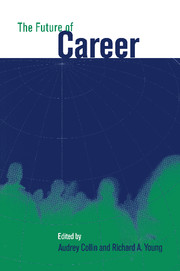Book contents
- Frontmatter
- Contents
- Notes on contributors
- Acknowledgements
- 1 Introduction: framing the future of career
- Part 1 Changing contexts
- Part 2 New perspectives
- 7 The future of boundaryless careers
- 8 Career development in a changing context of the second part of working life
- 9 The future of women's career
- 10 Career or slide? Managing on the threshold of sense
- 11 Epic and novel: the rhetoric of career
- Part 3 New directions for theory, practice and policy
- Author index
- Subject index
8 - Career development in a changing context of the second part of working life
Published online by Cambridge University Press: 06 January 2010
- Frontmatter
- Contents
- Notes on contributors
- Acknowledgements
- 1 Introduction: framing the future of career
- Part 1 Changing contexts
- Part 2 New perspectives
- 7 The future of boundaryless careers
- 8 Career development in a changing context of the second part of working life
- 9 The future of women's career
- 10 Career or slide? Managing on the threshold of sense
- 11 Epic and novel: the rhetoric of career
- Part 3 New directions for theory, practice and policy
- Author index
- Subject index
Summary
The notion of career in the first decades of the twenty-first century will undoubtedly have a different configuration. Linear and stable dimensions will in future give way to non-linear, unstable, and even chaotic components. Young people will have to function within these contingencies in order to accomplish their specific career paths. Adults in the second part of their working lives will have already experienced numerous career transitions: job changes, disparate careers, multiple kinds of training.
Given this double complexity of an active ageing population and a society that is grappling with profound transformations, how does one conceive of career? In a world of constant change, does the term ‘career’ still apply to people who are forty years of age or older? Or should we speak of two early deaths: the first, given its changing meaning in a postmodern context that is increasingly characterised by precariousness, flexibility, instability, intermittance, and insecurity, the death of career in the traditional sense of the term; and the second, if we believe (in part, incorrectly, as we will later see) that adults in the second part of their working life – the vast majority – experience a certain vocational decline, the death of career among most ‘active’ adults? If we take into account the possible characteristics of the social and economic context of the first two decades of the twenty-first century forecast by Bridges (1994), Giddens (1990), Naisbitt and Aburdene (1990), Rifkin (1995), and Toffler (1990), should we conclude that the meaning of career will be transformed?
- Type
- Chapter
- Information
- The Future of Career , pp. 115 - 129Publisher: Cambridge University PressPrint publication year: 2000
- 12
- Cited by



